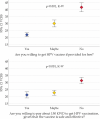Willingness to get HPV vaccination among female university students in Kuwait and its relation to vaccine conspiracy beliefs
- PMID: 37005342
- PMCID: PMC10088927
- DOI: 10.1080/21645515.2023.2194772
Willingness to get HPV vaccination among female university students in Kuwait and its relation to vaccine conspiracy beliefs
Abstract
A substantial burden of high-risk human papillomavirus (HPV) infections and HPV-related cancers can be mitigated by vaccination. The current study aimed to investigate the willingness of female students at the University of Kuwait to get HPV vaccination and its possible association with general vaccine conspiracy beliefs (VCBs). This cross-sectional survey study was conducted during September-November 2022 using a validated VCB scale as the survey instrument. The final sample comprised 611 respondents with a median age of 22 y and a majority of Arab ethnicity (n = 600, 98.2%). Only 360 respondents (56.9%) heard of HPV before participation and these students showed an above-average level of HPV knowledge (mean knowledge score of 12.7 ± 2.6 out of 16 as the maximum score), of whom only 33 self-reported HPV vaccine uptake (9.2%). The willingness to accept free-of-charge HPV vaccination was seen among 69.8% of the participants, with 20.1% who were hesitant and 10.1% who were resistant. The acceptance of HPV vaccination if payment is required was 23.1%. Reasons for HPV vaccine hesitancy/resistance included complacency to the HPV disease risks, lack of confidence in HPV vaccination, and inconvenience. The embrace of VCBs was associated with significantly higher odds of HPV vaccine hesitancy/resistance. The current study showed the detrimental impact of endorsing vaccine conspiracy beliefs manifested in lower intention to get HPV vaccination among female university students in Kuwait. This should be considered in vaccine promotion efforts aiming to reduce the burden of HPV cancers.
Keywords: Vaccine attitude; awareness; sexually transmitted infection; vaccine acceptance.
Conflict of interest statement
No potential conflict of interest was reported by the author(s).
Figures





References
-
- Boda D, Docea AO, Calina D, Ilie MA, Caruntu C, Zurac S, Neagu M, Constantin C, Branisteanu D, Voiculescu V, et al. Human papilloma virus: apprehending the link with carcinogenesis and unveiling new research avenues (Review). Int J Oncol. 2018;52:637–55. doi:10.3892/ijo.2018.4256. - DOI - PMC - PubMed
MeSH terms
Substances
LinkOut - more resources
Full Text Sources
Other Literature Sources
Medical
